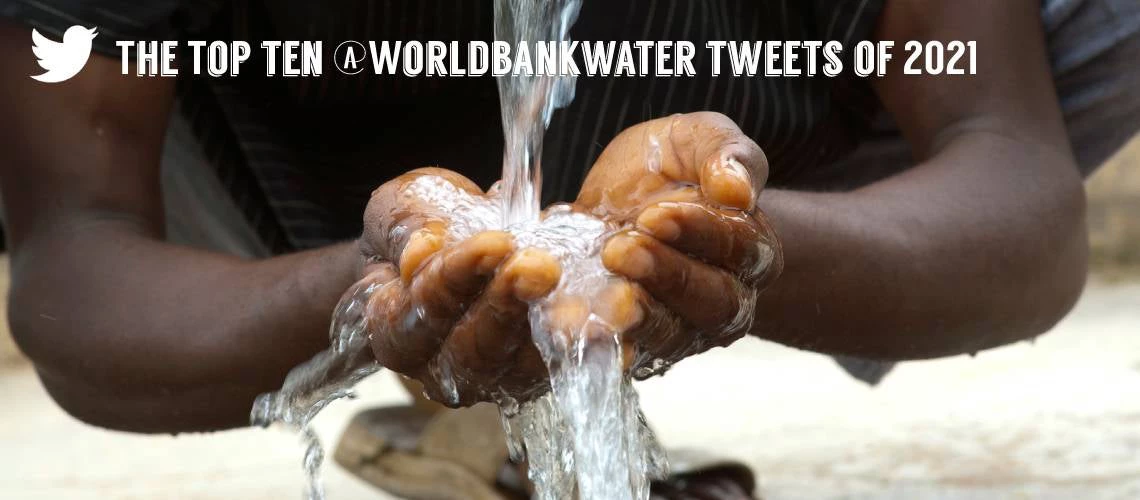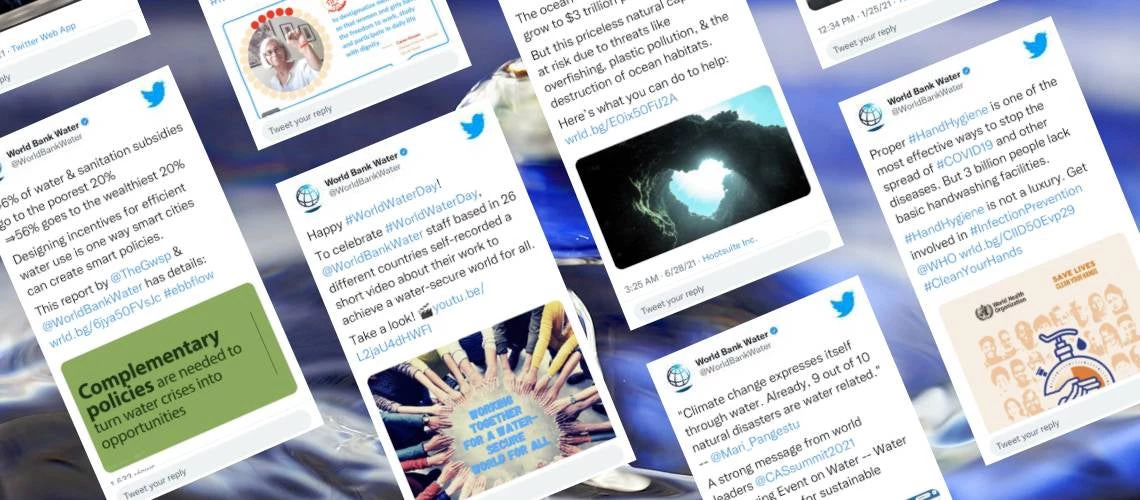 Top Tweets 2021
Top Tweets 2021
From the ongoing effects of the pandemic to extreme weather events to prolonged conflict and forced migration, 2021 was another year of tumultuous events.
The common thread among all of these? Water. Water is essential to curbing the spread of infectious diseases, including the coronavirus. It’s also the primary medium through which we feel the impacts of climate change, which has increased the frequency and intensity of droughts, floods, and rainfall variability. And water deficits are linked to 10% of the rise in global migration and exacerbate the stresses that provoke conflict in fragile states.
Throughout the year, all of these themes had a notable impact on the @WorldBankWater Twitter community and earned some of our highest engagement rates.
Here are the top 10 Tweets of 2021 from @WorldBankWater:
Kicking off our list is a message of collaboration to celebrate World Water Day. World Bank colleagues from 26 different countries recorded a short video message to describe the work we’re doing to build and rehabilitate water and sanitation infrastructure, develop water-efficient irrigation systems, provide emergency WASH kits, provide household toilets and connections to sewage systems, and much, much more. The video, which offered a behind-the-scenes peek at the World Bank Water Global Practice, garnered the most engagements from our audience.
The global climate crisis is inextricably linked to water: 90% of all natural disasters are water-related. When World Bank Managing Director of Development Policy and Partnerships Mari Pangestu spoke about this connection at the Climate Adaptation Summit's Anchoring Event on Water, our Twitter followers stepped up to share the message and help raise awareness.
To mark World Toilet Day, World Bank Water Global Director Jennifer Sara, Water and Sanitation Specialist Awa Diagne and External Affairs Officer for Cote d'Ivoire Enoh Ndri hosted a live event in which they discussed the connection between sanitation and climate change. The event, which took place in both English and French, shifted the conversation from human waste as a risk to a resource, exploring the enormous potential of wastewater as a reliable source of water, fertilizer, and energy.
The pandemic has underscored the vital importance of hand hygiene, but access to handwashing facilities and support for the behaviors remains stubbornly low. Three billion people around the world still lack access to a handwashing facility at home. Nearly half of all schools and 16 percent of healthcare facilities have no hand hygiene facilities. Hand hygiene must become a priority in both policy and practice. When we shared this message from the World Health Organization, it resonated with our audience.
Protecting our oceans is undoubtedly a priority for our Twitter community. With the onset of climate change, we are just beginning to understand the life-giving functions the ocean has to offer for our very existence. These waters provide more than 60 percent of the oxygen needed for planet earth’s survival.
There are more than 1 billion migrants in the world today – and water deficits are linked to 10% of the rise in global migration. Climate change is fueling water-induced migration, as rainfall variability drives people to search for better prospects elsewhere. The report, Ebb and Flow: Water, Migration, and Development, which examines the link between water and migration, and the implications for economic development, was released during World Water Week in August. Our tweets about the report were shared widely by social media influencers.
The impacts of COVID-19 have reinforced the challenges associated with menstruation, as crucial WASH resources have been diverted to cope with the pandemic, exacerbating existing inequalities for women and girls. Investing in menstrual health and hygiene is a fundamental part of the Bank’s WASH projects and has been integrated into our COVID-19 emergency response interventions in WASH. Our Twitter community showed strong support for this message featuring Caren Grown, former Global Director of the World Bank's Gender Group.
In Uganda, farmer-led irrigation holds the potential to transform food security and livelihoods, but even as climate-change poses an ever-increasing threat, the majority of the country's farmers continue to rely on rain-fed agriculture. In 2020, the World Bank helped launch the Micro-Scale Irrigation Program, to support and empower farmers across the country. This animated video about the program was popular with our followers.
Over the last two decades, floods and droughts – two of the most devastating consequences of the climate crisis -- have affected 3 billion people, with staggering costs in human suffering and economic loss. The World Bank report, An EPIC Response: Innovative Governance for Flood and Drought Risk Management, launched on World Day to Combat Desertification and Drought, offers guidance on how national governments can holistically manage these hydro-climatic risks:
A forward-looking tweet closes out our top ten list: The Utility of the Future Challenge. Open to participants 30 years old and younger, the UoF challenge invited participants to imagine a future where water utilities provide reliable, safe, inclusive, transparent, and responsive WSS services through best-fit practices and then design a strategy to turn that vision into a reality. Easy, right? Our Twitter community shared the message, and ultimately, two students from India and Belgium worked together to design the winning submission:
The Utility of the Future Challenge re-emphasized what we already knew: everyone can contribute to a better water sector. The @WorldBankWater social space illustrates this daily, through insightful observations and engaging discussions. As we look to 2022, we want to thank you for continuing to inspire and motivate us as we work together for a water-secure world for all.



Join the Conversation